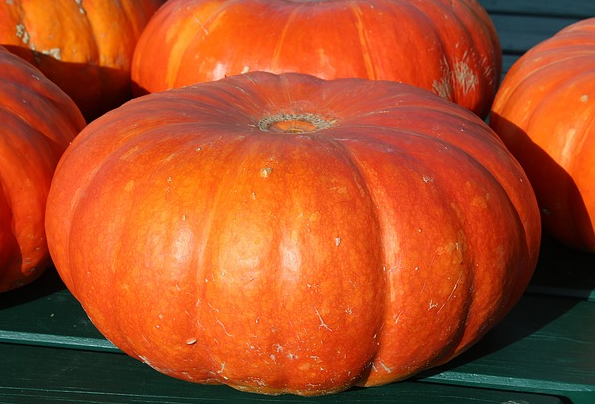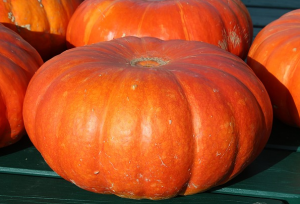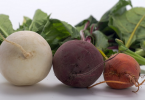Today’s question: can dogs eat pumpkin? Is pumpkin good or bad for dogs? Scroll down to find out.
Now that fall has arrived, everyone’s kitchen is filling up with this season’s star, the pumpkin. We all love pumpkins and the signs of fall! The pumpkin itself has so many uses, as both a decoration and as a food. Using the pumpkin as food is a great addition to any diet, and is often eaten by both humans and animals. Pumpkins left outside as a decoration are often eaten up by squirrels, deer, and other outdoor animals.
Most people around the world love their pumpkins, and this is why we are cooking it so often. Pumpkins are easy to grow, easy to attain, and easy to add into most any dish. Pumpkin may be cooked, grilled, baked, fried, and even the seeds may be baked and enjoyed! Pumpkin can be added into breads and muffins, made into a pie, and smoothed into a smoothie. Pumpkin tastes great, smells good, and has a pleasant color and texture. Adding pumpkin to your diets in the fall is a nice treat and a symbol to many that summer has ended.
Cooking and baking with pumpkins is great fun, but running around the kitchen and following the recipe is not an easy thing to do when you look down and see your dog staring at you. Your dog is offering you the puppy-dog eyes and whimpering, asking for a piece of this fall treat. You may begin to wonder: Can dogs eat pumpkin? Is my dog truly asking for his/her fair share of this fall treat? Do dogs look forward to pumpkins too?
Let’s find out!
Can Dogs Eat Pumpkin?
The short answer is yes.
Pumpkin is actually a fruit, and not a vegetable. Surprisingly, pumpkin is one of those foods that is both great for humans and dogs. You do not have to worry about giving your dog a piece of pumpkin while cooking it. Not only would s/he like it, there are also numerous benefits which impacts your dog greatly. Fresh pumpkin is ideal, but other varieties work just as well. When feeding your dog human foods, whole foods are best, prepared by you at home and with the knowledge of the ingredients.
Canned pumpkin is the simplest way to give the super food to your dog. Canned pumpkin is packed with nutrients just as the fresh pumpkin is. Canned pumpkin is a puree that is easy to mix in with your pet’s food. You may coat kibble with canned pumpkin, or perhaps spread upon a bone to add to the joy of eating it. You can give a spoonful of pumpkin as a treat, or use the puree as an ingredient when you make dog treats. When buying canned pumpkin from the grocery store, make sure the label states the can contains 100% of pumpkin puree and not pumpkin pie mix.
You may also puree your own pumpkin mixture rather than trust the canned pumpkin variety. Grow your own pumpkin or buy a pumpkin from a trusted source, scoop out the mixture, remove the seeds, and puree. There are recipes online that may be easier for you to create and offer your dog. You may also find pumpkin puree recipes especially designed for your dog and deemed safe. Your vet may also have good information on how to best offer pumpkin puree to your dog.
There is a difference between pureed pumpkin and pumpkin pie filling. Only offer pureed pumpkin to your dog, never pie filling. Avoid giving your dog sugary pumpkin or that spicy pumpkin pie filling. Dogs are just as apt to gaining weight and developing diabetes from over consumption of sugar, just as humans are. Dogs do not need added sugar and the sugar itself will only cause problems in your dog and alter his/her taste preferences.
You may not offer pumpkin pie filling to your dog; however, you can give your pet fresh pumpkin. When offering fresh pumpkin it is recommended to cook it first. Cooking the pumpkin will soften the mixture to ensure smooth swallowing of the food. The soft pumpkin will also digest easier and not be a potential risk of intestinal blockage. Cooking any fruit or vegetable before offering to your dog will also remove any harmful bacteria or chemical from the food that may be a toxin to your dog. After cooking the pumpkin and removing seeds, serve him/her the insides of a fresh roasted or pureed pumpkin.
Do not feed your dog leftover Halloween pumpkins. These pumpkins are likely in a severe state of decay and harboring mold and bacteria that are toxic to pets when ingested. Leftover pumpkins may also have paint and other decorations left on the remainder of the pumpkin, or perhaps chemicals and residue from the area in which the Halloween pumpkin was displayed. In the event your dog has eaten an old pumpkin, watch for symptoms of distress, and be mindful of potential complications. Notify your vet as well, so that your vet is able to guide you in the directions to follow.
When offering your dog pumpkin as a treat, make sure not to exaggerate with the amounts of pumpkin you are giving him/her. Since all the nutrients will be converted into vitamin A, you can imagine that large quantities of pumpkin equal a great amount of vitamin A. Dogs benefit from added vitamins but do not ‘need’ the added vitamins. Dogs may actually suffer serious consequences of overindulging in certain vitamins as exaggerated amount can be toxic and cause death.
Offering your dog too much pumpkin and having your dog ingest too much vitamin A might not seem problematic to you, but an excessive quantity of vitamin A is very toxic to dogs. A few teaspoons a day for the puppies and a few tablespoons for more mature dogs will be just fine. Pumpkin is a great food to add regularly into their diet, when approved by a vet.
Eating a pumpkin may be a good way to offer human food to pets, but bear in mind that leaves and stems need to be removed first. Don’t let your dog to ingest them. These areas of the pumpkin are covered with sharp little hairs that may irritate your pooch. Stems and leaves are not meant for consumption as the center of the pumpkin is. Stems may also pose a choking hazard do their tough nature and inability to really chew and digest. Swallowing a stem may also cause an intestinal blockage that leads to death. If your dog has eaten the stem of a pumpkin, you should take him./her to the dog hospital asap to prevent a fatal accident.
If you don’t have any pumpkins available, check out these wonderful organic [easyazon_link identifier=”B0012KF79G” locale=”US” tag=”frtp-20″]pumpkin treats for dogs[/easyazon_link].
Health Benefits of Pumpkin
Digestion
Dogs need fibers in their diet and pumpkin will provide them with the necessary amount. Pumpkin contains nearly 3 grams of fiber per one cup of serving. Additional fiber can help with your dog’s constipation or diarrhea. A constant bowel movement will maintain the health of the cells that are lining the gut. On the other hand, pumpkin may offer too much help in this area and cause further stomach upset. You must watch your dog and work with him/her to determine the right amount of pumpkin and the right amount of fiber that s/he is able to tolerate.
To incorporate pumpkin into your dog’s diet, you may begin by adding one tablespoon or two (depending on the dog’s size) to his/her meals. This way you will make sure that his/her digestion will be regular. Also, if your dog has problems with the stomach or suffers from indigestion, giving him a bit of pumpkin will make miracles? The smooth texture of the pumpkin is known to soothe indigestion and cool the discomfort of an inflamed stomach lining.
Urinary Tract
The recent studies have shown that pumpkin seeds, the ones we always throw away, are extremely beneficial to your dog’s health. Why? Because the pumpkin seeds are filled with antioxidants and fatty acids. Antioxidants help boost the immune system of your dog while also maintaining the health of your dog’s skin and coat. Fatty acids are an easy way in which you may improve the look and feel of the skin of your dog and prevent any itchy rashes or outbreaks. Pumpkin seeds are rich in omega 3 fatty acids, which contain anti-inflammatory properties. However, it’s best to feed your dog a few seeds in one setting. The fat content of the seeds have a potential effect of causing softer stools. Seeds can also be crushed and put into your dog’s meals.
Another great thing about pumpkin is its flesh. Yes, the flesh! The oils that can be found in there along with the seeds will be a great support for the urinary tract. So, you do not need to worry about your dog getting any bacteria in that area and having a urinary infection if you are constantly feeding him pumpkin in recommended doses.
You can also lower the chance of your dog developing cancer by introducing pumpkin into his diet. This food is loaded with vitamin A, potassium, iron, beta-carotene, and iron, all of which form an incredibly healthy combination that will impact your canine friend’s health in a positive way.
Weight Loss
Dogs are naturally drawn to pumpkin. You can also use it if you are looking to take off a few pounds from your dog. Simply add less kibble to his meals and mix it with some pumpkin. As to the nutritional values, there is no need to worry. Your dog’s tummy will feel full because of the extra fiber content and he will gladly thank you for the delicious new flavor.
Moisture
Pumpkin contains 90 % of water which is great since it adds moisture to your pet’s diet. Especially if you feed your dog highly processed and dehydrated kibble. These foods that are Moisture-deficient can have a dehydrating effect on the pet’s body. They require greater secretion of gastric acid and pancreatic enzymes to promote digestion. Pumpkin or just added water will help with that issue.
Parasites
Pumpkin seeds contain an amino acid called cucurbitin which works great as a means to get rid of worms in dogs. It makes the intestinal parasites and tapeworms paralyzed. An easy way to prepare pumpkin seeds for de-worming purpose is by grinding up properly preserved or fresh pumpkin seeds into a powder. Mix 1 teaspoon of pumpkin seed powder with a marble-sized portion of canned food for 3 times a day. You can also sprinkle it on your dog’s food. However, this way you may run the risk of the full dosage not being consumed.
Conclusion
It’s okay to give your dog a little bit of cooked fresh or canned pumpkin every day. Just avoid the raw version, since it might contain bacteria and the last thing you want is to see your dog suffering. Also, if you know that your dog is suffering from chronic kidney disease or diabetes, you should first ask the veterinarian about whether you should feed him pumpkin. If you choose the canned version, make sure that it is natural and not filled with sugar.
As you can see, dogs can eat pumpkin and as usual, moderation is the key. All the benefits mentioned earlier could be of great help to your canine friend!
Related articles:
References:
http://www.pet360.com/dog/nutrition/is-pumpkin-good-for-my-pet/Ob7HOgPkQk-5B5vwSVndSg
http://www.petmd.com/blogs/thedailyvet/pmahaney/2012/nov/health_benefits_of_pumpkin_for_pets-29465
http://www.dogchannel.com/dog-food/pumpkin-and-dogs.aspx
http://www.desu.edu/sites/default/files/Pumpkin%20Seeds-Worms_DJO.pdf
http://nutritiondata.self.com/facts/vegetables-and-vegetable-products/2601/2









Leave a Comment